Breakthrough for Bishop
Thomas Bishop and his twin brother David showed a lot of early promise. But it was Thomas who appeared to be on track to follow in the footsteps of Alistair and Jonny Brownlee after a silver medal at the 2010 ITU Junior World Championship and bronze medals at the 2011 and 2012 Under 23 Worlds.
After all, he was just 21 and, as a fellow resident of Leeds, he worked out with the superstar Brownlees and learned the meaning of hard training. But instead of instant stardom, Tom Bishop found himself without a podium in top ITU events for four years. Last September, Bishop was encouraged with a 5th place finish at WTS Edmonton 31 seconds behind Jonny Brownlee, 14 seconds behind Mario Mola and 9 seconds behind Richard Murray.
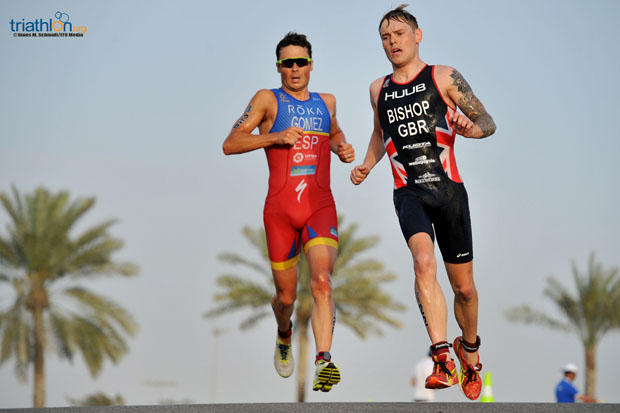
Last weekend Bishop proved he could race with the best at WTS Abu Dhabi where he dueled with 5-time ITU World Champion Javier Gomez for the win. While Gomez ultimately prevailed, Bishop held on to finish 2nd, ahead of stars like Vincent Luis, Fernando Alarza, Murray, 2016 WTS champion Mola and 2016 Grand Final winner Henri Schoeman.
Slowtwitch: At the start of your career you had a silver at the 2010 Junior Worlds in Budapest, bronze at the 2011 and 2012 Under 23 Worlds in Beijing and Auckland. What did it feel like?
Thomas Bishop: It seems such a long time ago. I was just trying to keep up with the Brownlees’ training program. It definitely worked to bring me on as an athlete and taught me what it was like to train hard. All I really remember from those races was that I committed hard in each of the swim bike and run disciplines. Beijing was great as three British guys made the podium [Matthew Sharp, David McNamee and Bishop]. It was something special and historic and it changed my view on racing as a team. Budapest has always stuck with me as Fernando Alarza got the gold and he has had a great career so far and I always compare myself to him, knowing that I had the capability to compete with him and the WTS medalists.
ST: What sports did you do before triathlon?
Thomas: I played football and cricket. I still enjoy other sports especially cycling, it’s such a tough and inspirational sport and we can learn a lot from the best!
ST: What were your strengths?
Thomas: I have always ridden my bike quite well and I must thank my heritage for that. My grandparents used to be really strong on the bike as well as my parents, who were marathon runners and triathletes too. I think I’m lucky that I can swim quite well in open water compared to how I swim in the pool.
ST: Why did you take up triathlon?
Thomas: Because I lost interest in swimming alone. I also found I was quite a good runner so naturally they aligned. My family was always very supportive and as we know once you do a triathlon, you get addicted!
ST: Who were your first coaches?
Thomas: Firstly my mum Hilary up to when I left home. And I have always been supported by Ben Bright and Rick Velati and other coaches from the British Federation. When I moved to Leeds, I began to work with Jack Maitland and Malcolm Brown [coaches of the Brownlees] and the other British Triathlon practitioners.
ST: What is the structure of your training?
Thomas: Within the British team, we are encouraged to take ownership of our program and create a working relationship with those around us. I still work with the Leeds team, including Liam O’Neill as well and I have learnt a lot from my travels around the world, training with other triathletes and coaches such as Marc and Helen Jenkins.
ST: How much did you work out with the Brownlees?
Thomas: When I first moved to Leeds, I tried to copy what Jonny and Alistair did and it worked really well in developing me as an athlete. But in the end it was too much for me and I began to get injured and tired as I kept pushing and tried to do more! Subsequently I had a few ‘lost years’ where I was trying to find my way in training and racing and my results didn’t really reflect the effort I put into training which showed that something wasn’t right.
ST: Did you harbor a longshot hope to make the team at Rio?
Thomas: The Rio Olympic Games gave me some direction and I trained hard to be part of the British team as a ‘Pilot Athlete’ to help the Brownlees on the swim and bike. I did not make the selection, although I did improve my swimming which definitely improved my racing.
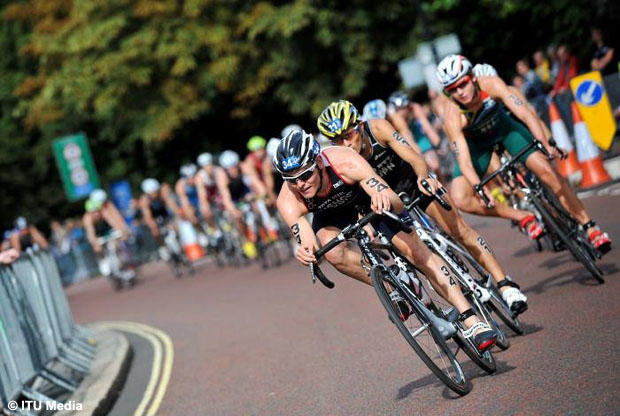
ST: Your road to 2017 was an up and down process. Was that discouraging?
Thomas: It was challenging and I felt lost at times. I must admit there were periods where I wasn’t enjoying myself and I thought about moving away from Leeds. But I always had good support from friends and family and they often reminded me of my desire to be the best I could be.
ST: Did you suffer injuries or illnesses during?
Thomas: I had a lot of trouble with my Achilles; I think this was down to too much running. I also got a stress fracture for the same reason. I didn’t look after myself as well as I could have, a lesson I have learnt for now.
ST: What were your most encouraging moments?
Thomas: I had a few good cross country results and good performances in triathlons like 6th at Mooloolaba World Cup in 2014 and 13th in the Stockholm World Series.
ST: What was your best improvements in swim, bike and run?
Thomas: I knew I could run and ride fairly well, but I worked to improve my swimming a lot. I spent a lot of time working with different swimming coaches and learning from other athletes how to improve. I went to Noosa and swam with JR’s squad who has the likes of athletes such as Jan Frodeno as well as super-fast Aussie swimmers. Swimming with some of the British girls such as Lucy (Hall) and Jess (Learmonth) has helped me too and I began to see improvements, exiting the water in the top 15s and 10s at World Series events.
ST: What were the most significant contributions your coaches with British Triathlon have made in your recent rise?
Thomas: I learned how to recover and not push my body to breaking point. I’ve had help to strengthen my weaknesses biomechanically too.
ST: What led to your encouraging 5th place at Edmonton in September?
Thomas: I think I was confident with my swimming (I exited in 5th or 6th) and as Jonny was in the break, I could ride conservatively and save my legs for the run. I like too cold too – haha! But really, since I didn’t make the Olympic Team, I had the desire to train really hard. We went to altitude for a month where I trained well with Adam Bowden and other athletes and I think that helped. But really I began to get my confidence back.
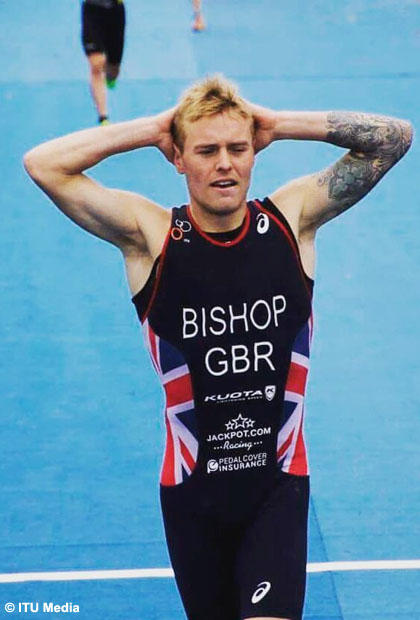
ST: How encouraged were you with your 15:00 5k run split at Edmonton which was 10 and 3 seconds slower than the kings of the run – Jonathan Brownlee, Mario Mola and Richard Murray?
Thomas: I was delighted with my running; my transitions were the problem and still are! But my training had gone well, I have a good group in Leeds, the British juniors are super talented and pushed me a lot!
ST: Where did you train off season for 2017?
Thomas: I stayed in Leeds for most of the winter. I went away for Portugal with the junior team before Christmas for a week but really most of my hard work was done with the group I train with in Leeds. Before Abu Dhabi, I spent two weeks in Lanzarote with three guys – Ali Rogers, Elliot Smales and Steve Sims – who helped me so much with my training, I can’t thank them enough.
ST: Who are your regular training partners?
Thomas: I train mostly with my friends who live in Leeds, we have a good riding group and we often have a laugh on the bike, even when training gets serious. The run squad is really strong too, as I have said before the British juniors and U23s really push me – Sam Dickinson, Jack Willis and Rich Allen – as well as the speedy Alex Yee occasionally! They all have a big future.
ST: What did your coaches have you focus on?
Thomas: We wanted to keep consistent and injury-free so that meant gradually introducing harder running, riding and swimming to my program, not all at once. My volume gradually increased too. We were just smart and logical.
ST: How well did you anticipate performing?
Thomas: I believed I could perform like Edmonton, but had no idea a medal was on the cards.
ST: How good is your run? Good enough to duel with the likes of Gomez and the Brownlees?
Thomas: My best 10k on the track was 29:58. [Bishop's run split at Abu Dhabi was 31:36, 13 seconds slower than Gomez and 33 seconds slower than Fernando Alarza, who finished 4th]
ST: How did your swim go?
Thomas: My swim was good [18:36, 8 seconds behind swim leaders]. I’m not a fast swimmer so I had to use my head and tactically make my way through the field. It helps I’m small [5’7”, 141 pounds] and can fit through gaps haha!
ST: Did you come close to missing the front pack on the bike?
Thomas: Yes, it was close but the British coach shouted at me to move up and I did. I used the [small] hill and wind to position myself well.
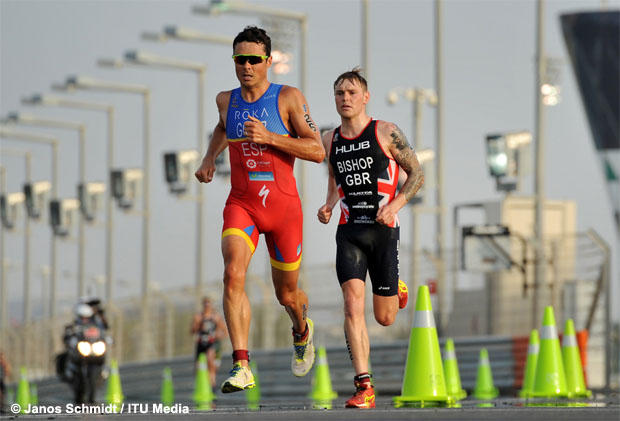
ST: Leaving T2, how hard did you push to go with the front 4?
Thomas: I went out pretty steady as the girls said that it’s a hard run and there was a danger of blowing up. I made sure I had a gel too. After the hill I opened up my stride to get across.
ST: Were you surprised you stuck with Gomez, Luis, Schoeman?
Thomas: Yes a bit, I knew I was in good shape but not that good.
ST: On the third lap of the run, did you have a good look at Gomez and Luis and Schoeman and how they were breathing, striding?
Thomas: Yes, I could see that the gap to third was stable but not definite. Gomez was his usual composed self so I never knew. He is famous for pushing at 6km so I was waiting for the inevitable.
ST: After the race, Gomez said he was saving energy on the third lap for the final lap. Could you tell at the time?
Thomas: Yes, I went to the front and slowed down, it was defensive and we both wanted to get to the finish! I was happy to control the pace for a bit but maybe Javier recognized that I was struggling.
ST: Midway through the third of four laps of the run, I think you surprised everybody by surging to an 8-meter lead before Gomez surged past to a 13 seconds margin of victory at the end. Any second thoughts on your strategy?
Thomas: I can’t remember too much to be honest, I just know that next time maybe I should try to predict the surges a bit more, but with the run, you generally go as hard for as long as you can. I just need a bit more strength and efficiency over 10km.
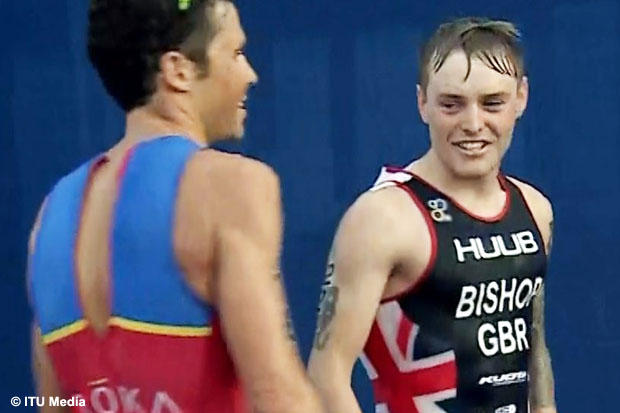
ST: What did it look like when Gomez went past?
Thomas: I was happy and honoured to be racing the champion. He is an inspiration to me. I think in my head I knew he would beat me and that could be why I lost. But in reality, I was in a position I had never been in before and he has a hundred times and his experience showed.
ST: What did this finish mean to you and your career?
Thomas: A lot. I hope it has given me the confidence to push on to the next level. I won’t get complacent now.
ST: What did Gomez say to you after the race?
Thomas: He was gracious and kind. He’s a great role model for everyone.
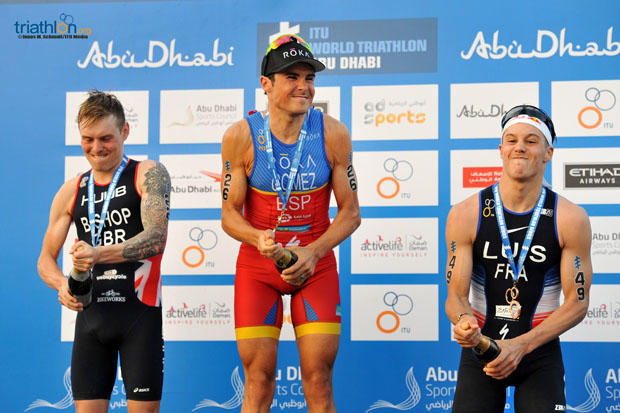
ST: What does it do for your confidence to have beaten the likes of Murray and Mola?
Thomas: I have beaten them once, and it has given me great confidence. But they are super stars and it won’t be easy to do it again. I know that every race now I have to be at my best to stand a chance against those guys.
ST: At age 25, what does the future hold for you?
Thomas: I really want to go the Olympic Games, that’s real dream of mine.


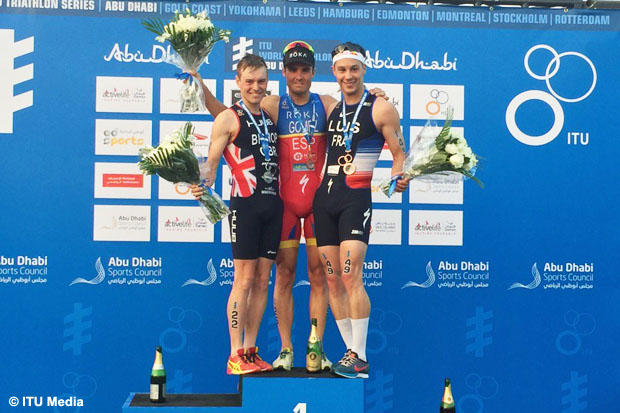
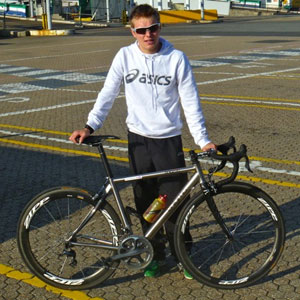
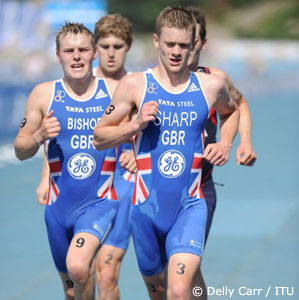
Start the discussion at slowtwitch.northend.network